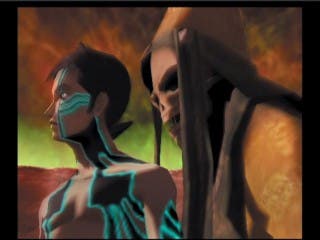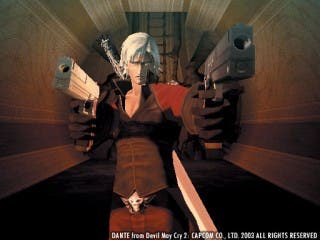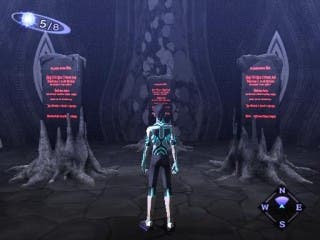Shin Megami Tensei: Lucifer's Call
Sympathy for the devil?
For someone who plays a lot of videogames - whether you're a reviewer or simply a games fan - there's a lot to be said for any title that does things a bit differently. Nowhere is this more true than in the world of RPGs; console RPG detractors may bang on about the "spiky-haired hero waking up on a beach with no memory and then saving the world from an ill-defined plot to destroy it" stereotype a lot, but even the most dedicated fans of the genre, myself included, have to admit that there's a grain of truth in there. Console RPG storylines are often excellent, but very often their creators fall back on the comfortably familiar faux-medieval setting and clichéd central character set. Witness even Star Ocean - set thousands of years in the future - which still found an excuse to dump you into medieval swashbuckling at the first possible opportunity.
That's part of the reason why, although it was deeply flawed in some other respects, we liked Shadow Hearts Covenant so much; the early 20th century setting was simply a refreshing break from what we're used to seeing in our RPGs. It's also unquestionably the main hook of Shin Megami Tensei: Lucifer's Call, the European name for Shin Megami Tensei Nocturne and the first of the much-vaunted and expansive SMT (or "MegaTen") series ever to arrive on these shores.
SMT (can we call you SMT? I think we can, since we can't be bothered setting up a Word macro for your lengthy and almost entirely nonsensical untranslated Japanese name - no offense) eschews all sign of medieval settings, beaches or indeed spiky-hairedness in favour of being set in present day Tokyo, complete with many of the districts, buildings and landmarks that will be familiar to anyone who's ever visited the eastern capital. It's populated - for the most part - with a cast of resolutely 21st century people, who dress in fashions you wouldn't be surprised to see in Tokyo's more upmarket districts, and it follows a plotline that wouldn't be out of place in a horror novel or particularly dark graphic novel or manga.

I predict a riot
Admittedly, your stay in Tokyo as we know it is limited. The fairly lengthy introduction to the game sees your character, a nameless teen, travelling across town to meet some schoolfriends and visit his hospitalised teacher. On the way, you'll learn of a riot (apparently between two opposed cult factions) and meet a well-dressed man who works for an occult magazine and is investigating.
You find the hospital deserted, and explore it with your two friends - only to be caught up in the apocalyptic Conception, an event which is surrounded in occult blabber about the rebirth of the world but ultimately means that everyone in Tokyo dies (although many of them hang around as souls you can converse with later) and the city is twisted into a kind of globe shape, with a strange moon called Kagatsuchi in the middle and vast expanses of black desert sand or jagged-edged abysses between the familiar city districts. It's all a bit of a mess, although if last week is anything to go by, if it happened in London we'd probably all just shake our ghostly heads in annoyance and complain about how badly the Conception has messed up the tube services. While drinking tea.
The other side-effect of the Conception is that the city is now teeming with demons, which is a bit of a problem - although arguably less so since you're now also a demon, thanks to the intervention of a spooky small child and his elderly carer, who admonishes you not to disappoint the young master by doing something daft like dying. Freshly endowed with demonic power - and a very fetching set of glowing body-spanning tattoos to prove it - you set off into Tokyo to get to the bottom of the Conception and, it gradually emerges, to fulfil some kind of destiny which awaits you as the world is reborn. Sounds hokey, but actually, it's all pretty interesting - and is bolstered by a strong cast of characters that you'll run into over the course of the game.

Demonic Pokemos
Of course, you're going to be battling a lot of demons along the way, not least because the game features that bugbear of all RPG fans, random battles. Fighting is accomplished by means of a fairly standard turn-based battle system which is heavily biased towards getting the elements of your attacks - and defence - correct, as characters and monsters in the game will often be able to deflect or even absorb some types of damage.
As you gradually find more "elements", called Magatama, your central character can swap them at will and change his elemental resistance and other stats, but other characters don't get that advantage so choosing your party for a specific area or battle becomes very important. This can be somewhat unforgiving, although in fairness the trial and error approach to strategy is more likely to see you getting a few beatings and bruises rather than the dreaded Game Over screen. However, it does introduce a nice element of strategy to the game and keeps you on your toes throughout, and despite the presence of a button to play out battles automatically, by simply using the same attacks over and over you'll rarely win battles in that manner after the first few hours of the game, as you'll need to pay attention to what's going on at all times.
The really interesting aspect comes in terms of how you build your party, though. You don't just battle demons - you can also talk to them, either in the field or in battles themselves. This is an essential part of the game, since you don't have any human companions in battle (as such...) - you rely entirely on recruiting demons to your side, either by bribery, cajoling or threatening them through a negotiation system that forms an interesting new addition to the traditional RPG battle system. This may sound a bit annoying, but actually it works very well, and the game successfully avoids being a demonic gotta catch 'em all by putting a tight limit on how many demons you can have in your party. You can, however, fuse two demons into one more powerful one at special temples dotted around Tokyo. This is a nice addition to the game; not least since it shows you the result of each fusion before you attempt it, so it isn't frustrating trial and error. Better still, it lets you turn low-powered demons into much more powerful ones without having to go through an annoying XP grind with them.

Shin splints
The story is good, the setting is interesting and the gameplay manages to remain entertaining despite the occasional teeth-grinding over an ill-timed random battle (although I should add that this isn't remotely as annoying as many random battle RPGs, the excellent Skies of Arcadia for example). The graphics are something of a mixed blessing with heavily stylised characters that are very reminiscent of Capcom's Killer 7 (in ways that you'll either love or hate) on the plus side, but are let down by some quite poor and repetitive backgrounds. That said, that may well simply be a consequence of setting a game in a modern city, as shopping centres aren't noted for their beautiful architecture, after all.
Musically, the game remains true to its 21st century setting, with a combination of rock, jazz and even j-pop style music rather than the baroque overtones which many games of this type adopt; it's all pretty decent, although there are a few stinkers in there on the soundtrack, but maybe that's just a reflection of modern day music, eh? Curiously, however, there's no spoken dialogue in the game, with everything conveyed through very well written text - even some character actions being described in text. It gives the whole thing the feel of a somewhat retro text adventure, but it's something you get used to very quickly, and it actually speeds up the game since you can skip through conversations as quickly as you can read them, rather than waiting for voices to catch up. While this isn't necessarily a plus point - as good voice acting adds a lot to a game - it's hardly a distressing negative either.
When it comes to rating Lucifer's Call, I'm torn between an eight and a nine. On one hand, the game is an incredibly unique and original departure from the normal conventions of this genre, offering the kind of dark stylish twist that RPGs have lacked for so long and building onto it some very solid gameplay. Balanced against that, however, is the somewhat unforgiving battle system and, most crucially, the whole random battle issue - which becomes more and more unforgivable in games as time goes by. Ultimately, then, it's this hangover from the NES era which drops Shin Megami Tensei: Lucifer's Call from the status of classic; it's a terrible shame that such a caveat should have to be given for this game, since otherwise I'd whole-heartedly recommend it as one of the best efforts ever at bringing "dark and brooding" to a genre overpopulated with spunky, spiky-haired idiots.

